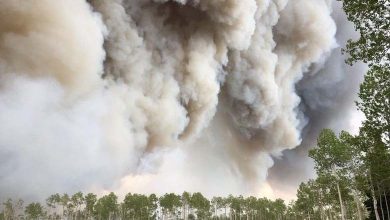Climate change hits Tunisian forests, afforestation key solution

Forests are a natural wealth and a shield against climate change, reducing heat retention, protecting soil from erosion, and contributing to biodiversity.
However, the frequency of wildfires in the country during this summer has threatened this biodiversity. In response, Tunisian authorities have launched an afforestation campaign by planting trees as a radical solution to combat desertification, mitigate heat retention, and provide a source of livelihood for local residents.
Forests in Tunisia cover about six million hectares, equivalent to 34% of the country’s area. The forest population comprises around one million inhabitants, representing 7% of the total population, contributing to 1.33% of the country’s gross domestic product and 14% of the agricultural output.
According to climate change researcher Samir Al-Qadri, afforestation aims to counter the impacts of climate change, restore vegetation cover, repair agricultural land, protect it from erosion, and preserve biodiversity, as well as plant and animal assets.
Al-Qadri stated that afforestation efforts typically cover between 10,000 and 15,000 hectares annually, but these efforts are often undermined by the severity of wildfires.
He explained that the country lost over 25,000 hectares of forests last year due to wildfires. The forests in Tunisian mountains contain trees planted hundreds of years ago.
Moreover, he added that certain tree species, like pine trees, face difficulty regrowing after being burned since they originally grew and thrived in climatic conditions with abundant rainfall. However, the current situation has changed, with Tunisia experiencing a rainfall deficit, making it challenging for these ancient species to regrow.
Additionally, the displacement of wild animals due to fires and the lack of water after the drying up of numerous springs in Tunisian mountains contribute to ecological imbalance.
On another note, activist Jalal Al-Salami mentioned that the forests are mainly concentrated in the north-western region between the “Khmir” and “Maqad” areas.
He explained that Tunisian forest wealth suffers from several factors such as drought and summer wildfires, tree cutting, and widespread theft of wood.
He affirmed that the vegetation cover in Tunisia is significantly damaged due to frequent fires and urban encroachment, leading to desertification in many areas, especially since Tunisia has 17 national parks, 27 natural reserves, and 42 internationally significant wetland areas.
emphasized that the solution to combat desertification is to plant new vegetation cover that provides a healthy environment and oxygen.
Forests also contribute to supporting economic activities by providing employment opportunities for residents of forested areas through projects such as beekeeping, Aleppo pine harvesting, or the distillation of medicinal herbs.
A Tunisian study titled “Anticipating Climate Change: Risks and Economic Opportunities” points to an increase in the frequency of forest fires. It is expected that wildfires will lead to the loss of 180,000 hectares by 2030, equivalent to an economic loss of $11.24 million.












